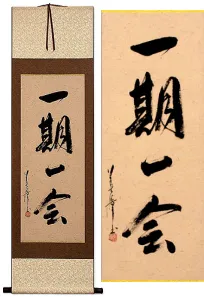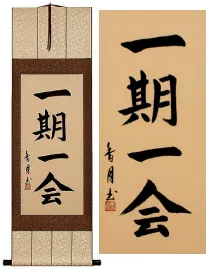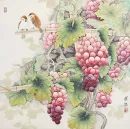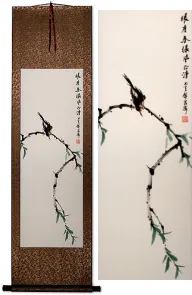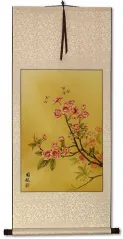Many custom options...
And formats...

The name Strong One in Chinese / Japanese...
Buy a Strong One calligraphy wall scroll here!
The Strong One
This in-stock artwork might be what you are looking for, and ships right away...
Gallery Price: $72.00
Your Price: $39.88
Gallery Price: $61.00
Your Price: $33.88
Gallery Price: $61.00
Your Price: $33.88
Gallery Price: $61.00
Your Price: $33.88
Gallery Price: $61.00
Your Price: $33.88
Gallery Price: $340.00
Your Price: $188.77
Gallery Price: $200.00
Your Price: $122.88
Gallery Price: $108.00
Your Price: $59.88
Not the results for strong one that you were looking for?
Below are some entries from our dictionary that may match your strong one search...
| Characters If shown, 2nd row is Simp. Chinese |
Pronunciation Romanization |
Simple Dictionary Definition |
強 强 see styles |
qiǎng qiang3 ch`iang chiang kyou / kyo きょう |
More info & calligraphy: Strong / Powerful / Force(suffix) (1) (ant: 弱・1) a little over; a little more than; (2) (ant: 弱・2) strength; the strong; (suffix) (3) powerhouse; one of the biggest; one of the most powerful; (suffix) (4) (after a number on the Japan Meteorological Agency seismic intensity scale; e.g. 5強) (ant: 弱・3) -upper (seismic intensity); (personal name) Tsuyomi Strong, forceful, violent; to force; to strengthen. |
打たれ強い see styles |
utarezuyoi うたれづよい |
More info & calligraphy: Resilient in the Face of Adversity |
三馬 三马 see styles |
sān mǎ san1 ma3 san ma minma みんま |
(place-name) Minma The three horses, one young, strong, and tractable; another similar but not tractable; a third old and intractable, i.e. bodhisattvas (or bodhisattva-monks), śrāvakas and icchantis. |
和尚 see styles |
hé shang he2 shang5 ho shang wajou / wajo わじょう |
Buddhist monk (1) (honorific or respectful language) preceptor or high priest (in Shingon, Hosso, Ritsu or Shin Buddhism); (2) second highest priestly rank in Buddhism; (3) master (of one's art, trade, etc.); (1) (honorific or respectful language) preceptor or high priest (in Tendai or Kegon Buddhism); (2) second highest priestly rank in Buddhism; (3) monk (esp. the head monk of a temple); (4) master (of one's art, trade, etc.); (1) (honorific or respectful language) preceptor or high priest (esp. in Zen or Pure Land Buddhism); (2) second highest priestly rank in Buddhism; (3) monk (esp. the head monk of a temple); (4) master (of one's art, trade, etc.); (personal name) Wajō A general term for a monk. It is said to be derived from Khotan in the form of 和闍 or 和社 (or 烏社) which might be a translit. of vandya (Tibetan and Khotani ban-de), 'reverend.' Later it took the form of 和尚 or 和上. The 律宗 use 和上, others generally 和尚. The Sanskrit term used in its interpretation is 鳥波陀耶 upādhyāya, a 'sub-teacher' of the Vedas, inferior to an ācārya; this is intp. as 力生 strong in producing (knowledge), or in begetting strength in his disciples; also by 知有罪知無罪 a discerner of sin from not-sin, or the sinful from the not-sinful. It has been used as a synonym for 法師 a teacher of doctrine, in distinction from 律師 a teacher of the vinaya, also from 禪師 a teacher of the Intuitive school. |
地藏 see styles |
dì zàng di4 zang4 ti tsang jizou / jizo じぞう |
Kṣitigarbha, the Bodhisattva of the Great Vow (to save all souls before accepting Bodhi); also translated Earth Treasury, Earth Womb, or Earth Store Bodhisattva (surname) Jizou Ti-tsang, J. Jizō, Kṣitigarbha, 乞叉底蘗沙; Earth-store, Earth-treasury, or Earthwomb. One of the group of eight Dhvani- Bodhisattvas. With hints of a feminine origin, he is now the guardian of the earth. Though associated with Yama as overlord, and with the dead and the hells, his role is that of saviour. Depicted with the alarum staff with its six rings, he is accredited with power over the hells and is devoted to the saving of all creatures between the nirvana of Śākyamuni and the advent of Maitreya the fifth century he has been especially considered as the deliverer from the hells. His central place in China is at Chiu-hua-shan, forty li south-west of Ch'ing-yang in Anhui. In Japan he is also the protector of travellers by land and his image accordingly appears on the roads; bereaved parents put stones by his images to seek his aid in relieving the labours of their dead in the task of piling stones on the banks of the Buddhist Styx; he also helps women in labour. He is described as holding a place between the gods and men on the one hand and the hells on the other for saving all in distress; some say he is an incarnation of Yama. At dawn he sits immobile on the earth 地 and meditates on the myriads of its beings 藏. When represented as a monk, it may be through the influence of a Korean monk who is considered to be his incarnation, and who came to China in 653 and died in 728 at the age of 99 after residing at Chiu-hua-shan for seventy-five years: his body, not decaying, is said to have been gilded over and became an object of worship. Many have confused 眞羅 part of Korea with 暹羅 Siam. There are other developments of Ti-tsang, such as the 六地藏 Six Ti-tsang, i. e. severally converting or transforming those in the hells, pretas, animals, asuras, men, and the devas; these six Ti-tsang have different images and symbols. Ti-tsang has also six messengers 六使者: Yama for transforming those in hell; the pearl-holder for pretas; the strong one or animals; the devīof mercy for asuras; the devī of the treasure for human beings; one who has charge of the heavens for the devas. There is also the 延命地藏 Yanming Ti-tsang, who controls length of days and who is approached, as also may be P'u-hsien, for that Purpose; his two assistants are the Supervisors of good and evil 掌善 and 掌惡. Under another form, as 勝軍地藏 Ti-tsang is chiefly associated with the esoteric cult. The benefits derived from his worship are many, some say ten, others say twenty-eight. His vows are contained in the 地藏菩薩本願經. There is also the 大乘大集地藏十電經 tr. by Xuanzang in 10 juan in the seventh century, which probably influenced the spread of the Ti-tsang cult. |
得意 see styles |
dé yì de2 yi4 te i tokui とくい |
proud of oneself; pleased with oneself; complacent (n,adj-na,adj-no) (1) satisfaction; pride; triumph; elation; (n,adj-na,adj-no) (2) one's strong point; one's forte; one's specialty; (3) regular customer; regular client; patron To obtain one's desires, or aims; to obtain the meaning (of a sutra). |
特長 特长 see styles |
tè cháng te4 chang2 t`e ch`ang te chang tokuchou / tokucho とくちょう |
personal strength; one's special ability or strong points strong point; forte; merit; strength |
目力 see styles |
mù lì mu4 li4 mu li mejikara; mejikara(ik) めぢから; めじから(ik) |
eyesight (i.e. quality of vision) strong impression conveyed by one's eyes; eyes that convey a strong sense of purpose |
身上 see styles |
shēn shang shen1 shang5 shen shang shinjou / shinjo しんじょう |
on the body; at hand; among (1) one's background; one's history; one's circumstances; (2) one's merit; asset; strong point |
那羅 那罗 see styles |
nà luó na4 luo2 na lo nara なら |
(place-name) Nara Naṭa; cf. 那吒; a dancer or actor 伎戲; or perhaps narya, manly, strong, one definition being 力. |
釋迦 释迦 see styles |
shì jiā shi4 jia1 shih chia shaka しゃか |
sugar apple (Annona squamosa) (personal name) Shaka (釋迦婆) Śakra.; Śākya. the clan or family of the Buddha, said to be derived from śāka, vegetables, but intp. in Chinese as powerful, strong, and explained by 能 powerful, also erroneously by 仁charitable, which belongs rather to association with Śākyamuni. The clan, which is said to have wandered hither from the delta of the Indus, occupied a district of a few thousand square miles lying on the slopes of the Nepalese hills and on the plains to the south. Its capital was Kapilavastu. At the time of Buddha the clan was under the suzerainty of Kośala, an adjoining kingdom Later Buddhists, in order to surpass Brahmans, invented a fabulous line of five kings of the Vivartakalpa headed by Mahāsammata 大三末多; these were followed by five cakravartī, the first being Mūrdhaja 頂生王; after these came nineteen kings, the first being Cetiya 捨帝, the last Mahādeva 大天; these were succeeded by dynasties of 5,000, 7,000, 8,000, 9,000, 10,000, 15,000 kings; after which long Gautama opens a line of 1,100 kings, the last, Ikṣvāku, reigning at Potala. With Ikṣvāku the Śākyas are said to have begun. His four sons reigned at Kapilavastu. 'Śākyamuni was one of his descendants in the seventh generation.' Later, after the destruction of Kapilavastu by Virūḍhaka, four survivors of the family founded the kingdoms of Udyana, Bamyam, Himatala, and Sāmbī. Eitel. |
香害 see styles |
kougai / kogai こうがい |
upsetting others with one's odour (strong perfume, etc.) |
手の物 see styles |
tenomono てのもの |
(1) one's own thing; thing held in one's hand(surname); (2) one's speciality; one's forte; one's strong point |
有主見 有主见 see styles |
yǒu zhǔ jiàn you3 zhu3 jian4 yu chu chien |
opinionated; having one's own strong views |
焼付く see styles |
yakitsuku やきつく |
(v5k,vi) (1) to be scorched into; to be seared into; (2) to make a strong impression; to be etched in (one's memory) |
片鉄炮 see styles |
katateppou / katateppo かたてっぽう |
{sumo} strong push with only one hand |
お手の物 see styles |
otenomono おてのもの |
one's speciality; one's forte; one's strong point |
マザコン see styles |
mazakon マザコン |
(1) (See マザーコンプレックス・1) being a mama's boy; having an (overly) strong attachment to one's mother; (2) (abbreviation) (See マザーコンプレックス・2) Oedipus complex; sexual attraction to one's mother; (personal name) Mazagaon |
一強他弱 see styles |
ikkyoutajaku / ikkyotajaku いっきょうたじゃく |
(expression) (yoji) one strong, many weak |
一強多弱 see styles |
ikkyoutajaku / ikkyotajaku いっきょうたじゃく |
(expression) (yoji) one strong, many weak |
一板一眼 see styles |
yī bǎn yī yǎn yi1 ban3 yi1 yan3 i pan i yen |
lit. one strong beat and one weak beats in a measure of music (two beats in the bar) (idiom); fig. follow a prescribed pattern to the letter; scrupulous attention to detail |
一板三眼 see styles |
yī bǎn sān yǎn yi1 ban3 san1 yan3 i pan san yen |
lit. one strong beat and three weak beats in a measure of music (four beats in the bar) (idiom); fig. scrupulous attention to detail |
力不從心 力不从心 see styles |
lì bù cóng xīn li4 bu4 cong2 xin1 li pu ts`ung hsin li pu tsung hsin |
less capable than desirable (idiom); not as strong as one would wish; the spirit is willing but the flesh is weak |
勵精圖治 励精图治 see styles |
lì jīng tú zhì li4 jing1 tu2 zhi4 li ching t`u chih li ching tu chih |
(of a ruler) to strive to make one's nation strong and prosperous (idiom) |
四不寄附 see styles |
sì bù jì fù si4 bu4 ji4 fu4 ssu pu chi fu shi fukifu |
The four to whom one does not entrust valuables— the old, for death is nigh; the distant, lest one has immediate need of them; the evil; or the 大力 strong; lest the temptation be too strong for the last two. |
学閥意識 see styles |
gakubatsuishiki がくばついしき |
strong feelings of loyalty to one's old school; the old school tie |
得意分野 see styles |
tokuibunya とくいぶんや |
one's field of expertise; one's strong area |
御手の物 see styles |
otenomono おてのもの |
one's speciality; one's forte; one's strong point |
手のもの see styles |
tenomono てのもの |
(1) one's own thing; thing held in one's hand(surname); (2) one's speciality; one's forte; one's strong point |
採長補短 see styles |
saichouhotan / saichohotan さいちょうほたん |
(noun/participle) (yoji) compensating for one's shortcomings by incorporating others' strong points |
Click here for more strong one results from our dictionary
The following table may be helpful for those studying Chinese or Japanese...
| Title | Characters | Romaji (Romanized Japanese) | Various forms of Romanized Chinese | |
| The Strong One | 強いもの | tsuyoi mono tsuyoimono | ||
Successful Chinese Character and Japanese Kanji calligraphy searches within the last few hours...










